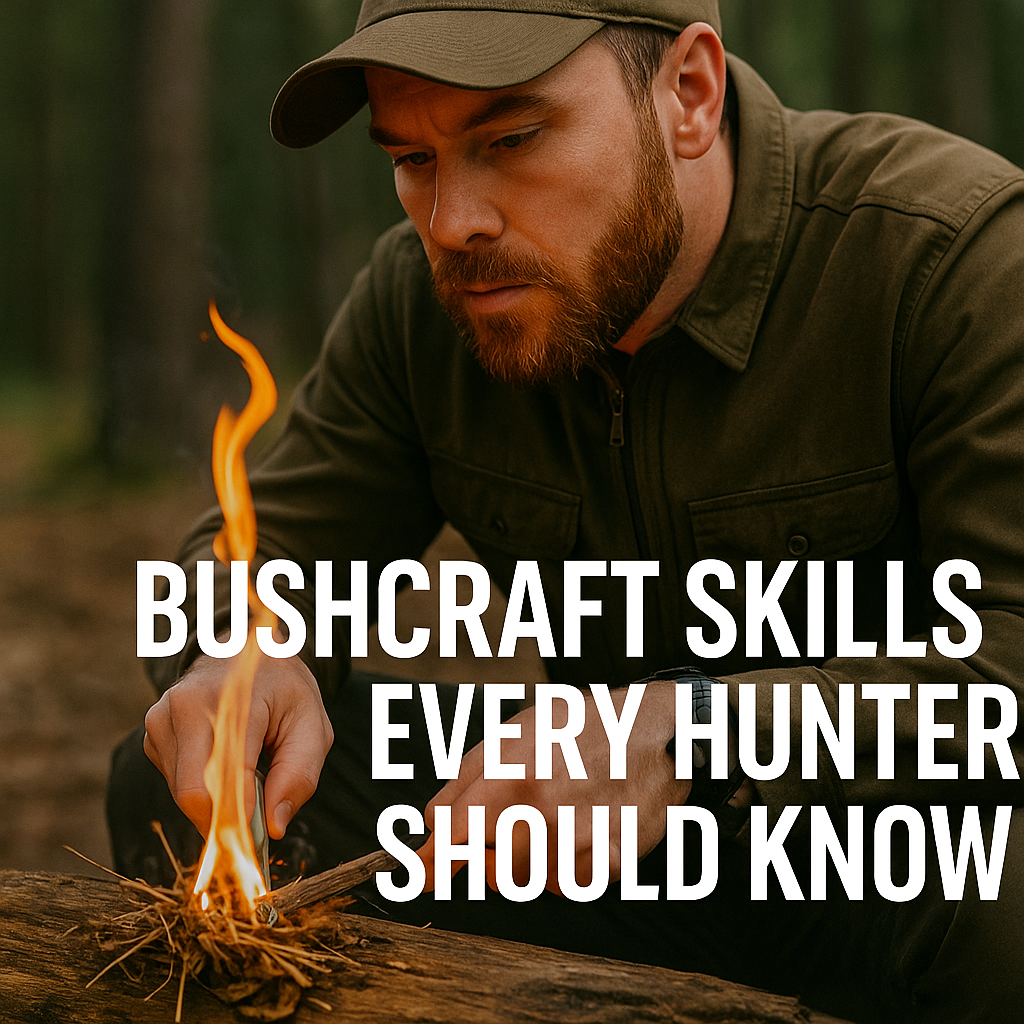
Hunting is more than carrying a rifle or bow into the woods. True hunters develop a deep connection with the land, mastering survival and bushcraft skills that make the difference between a good day outdoors and a dangerous situation. Whether you’re chasing elk in the Rockies, stalking whitetails in the Midwest, or waiting on wild hogs in the South, the wilderness demands respect.
In this guide, we’ll cover the bushcraft skills every hunter should know—skills that not only keep you safe but also make you more effective, resourceful, and confident in the field.
Table of Contents
Many hunters today rely heavily on modern gear—GPS, rangefinders, synthetic clothing, and freeze-dried meals. While these tools are useful, batteries die, weather shifts, and unexpected challenges arise. Bushcraft is about self-reliance, using natural resources and traditional techniques to survive and thrive in the wild.
Key reasons bushcraft is essential for hunters:
When weather turns bad, a solid shelter can save your life. Even with modern tents, hunters should know how to build one from natural materials.
Pro Tip: Always build with wind direction and drainage in mind. A poor shelter location can be worse than none.
A fire provides warmth, cooks food, purifies water, and boosts morale. Every hunter should master multiple fire-starting methods.
Bushcraft Fire Tips:
Dehydration kills faster than hunger. Hunters can’t always rely on carrying gallons of water, especially during long backcountry hunts.
SEO Keyword Integration: “bushcraft water purification techniques for hunters”
GPS devices are fantastic—until batteries die or satellites fail. Traditional navigation is a vital hunter’s skill.
Pro Tip: Always carry a backup compass and mark mental landmarks when scouting or tracking game.
Bushcraft and hunting overlap strongly in tracking. Hunters who can “read the land” gain an advantage in finding game.
Practical Use: Even if game trails are faint, a skilled tracker can follow subtle clues to locate deer, elk, or other targets.
While hunters aim to harvest game, knowing edible plants and fungi increases survival odds and deepens wilderness knowledge.
Never eat unknown plants—many are toxic. Use the “Universal Edibility Test” only as a last resort.
Hunters often find foraging handy while waiting in blinds or when extending hunting trips.
A bushcraft knife is a hunter’s best friend. Beyond field dressing game, it can be used for shelter building, carving traps, and fire preparation.
Accidents happen in hunting. A hunter without medical knowledge is vulnerable.
Bushcraft Tip: Learn how to use natural resources—like moss as bandages or willow bark for pain relief.
Modern forecasts help, but hunters must read nature’s signals.
Hunters who anticipate weather changes avoid getting stranded or surprised.
In a survival situation, knowing how to set snares and traps provides backup food.
Ethics Note: Use only in survival or where legal. Hunting should remain ethical and conservation-focused.
After a successful hunt, preparing meat in the field is crucial.
Not only does this preserve food, but it also connects you to ancient hunting traditions.
Perhaps the most underrated bushcraft skill is mental toughness. Survival often comes down to attitude.
Hunters with strong bushcraft skills approach the hunt with confidence and respect.
Q1. What bushcraft skill is most important for hunters?
Firecraft and navigation are the top priorities—fire for survival, navigation for safety.
Q2. How do bushcraft skills improve hunting success?
They increase awareness, reduce reliance on gear, and make hunters better trackers and observers.
Q3. Do all hunters need bushcraft training?
Yes. Even weekend hunters benefit from knowing shelter, water, and fire basics.
Q4. What’s the difference between bushcraft and survival skills?
Bushcraft focuses on thriving and working with nature; survival is about emergency situations.
Bushcraft isn’t just about survival—it’s about mastery of the land, resourcefulness, and self-reliance. For hunters, these skills are invaluable. Whether you’re deep in the backcountry or a few miles from your truck, nature is unpredictable. By learning bushcraft skills every hunter should know, you ensure safety, success, and a stronger connection to the wild.
So, next time you head into the woods, don’t just bring your rifle or bow. Bring knowledge, resilience, and the bushcraft mindset. That’s what separates a true hunter from a weekend shooter.
Choosing the best tree stands under $300 is one of the smartest investments a hunter…
When dark clouds roll in and rain starts falling, many hunters pack up their gear…
Competitive shooting requires skill, precision, and the right equipment. Whether you're a seasoned competitor or…
The world of archery is undergoing an exciting evolution. What once were purely mechanical tools…
Welcome to the latest 2025 hunting-season guide, tailored for readers of TheShootingGears. Whether you’re carving…
Technology is revolutionizing the way we hunt and shoot. From GPS mapping and ballistics calculators…
This website uses cookies.